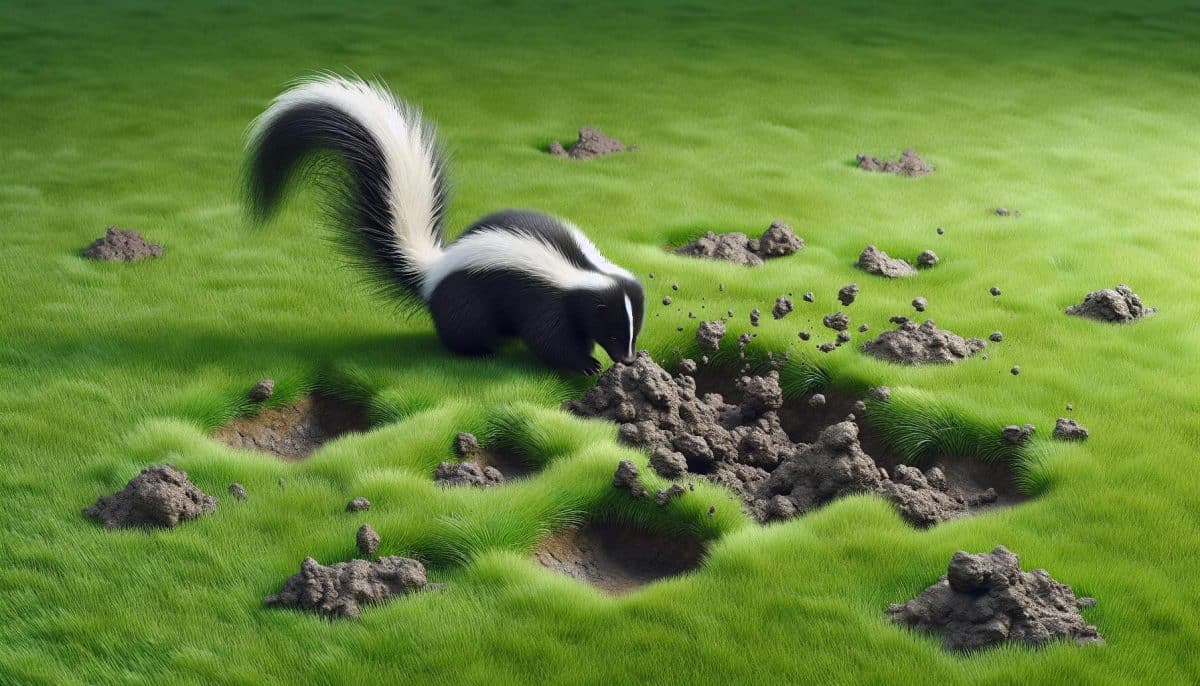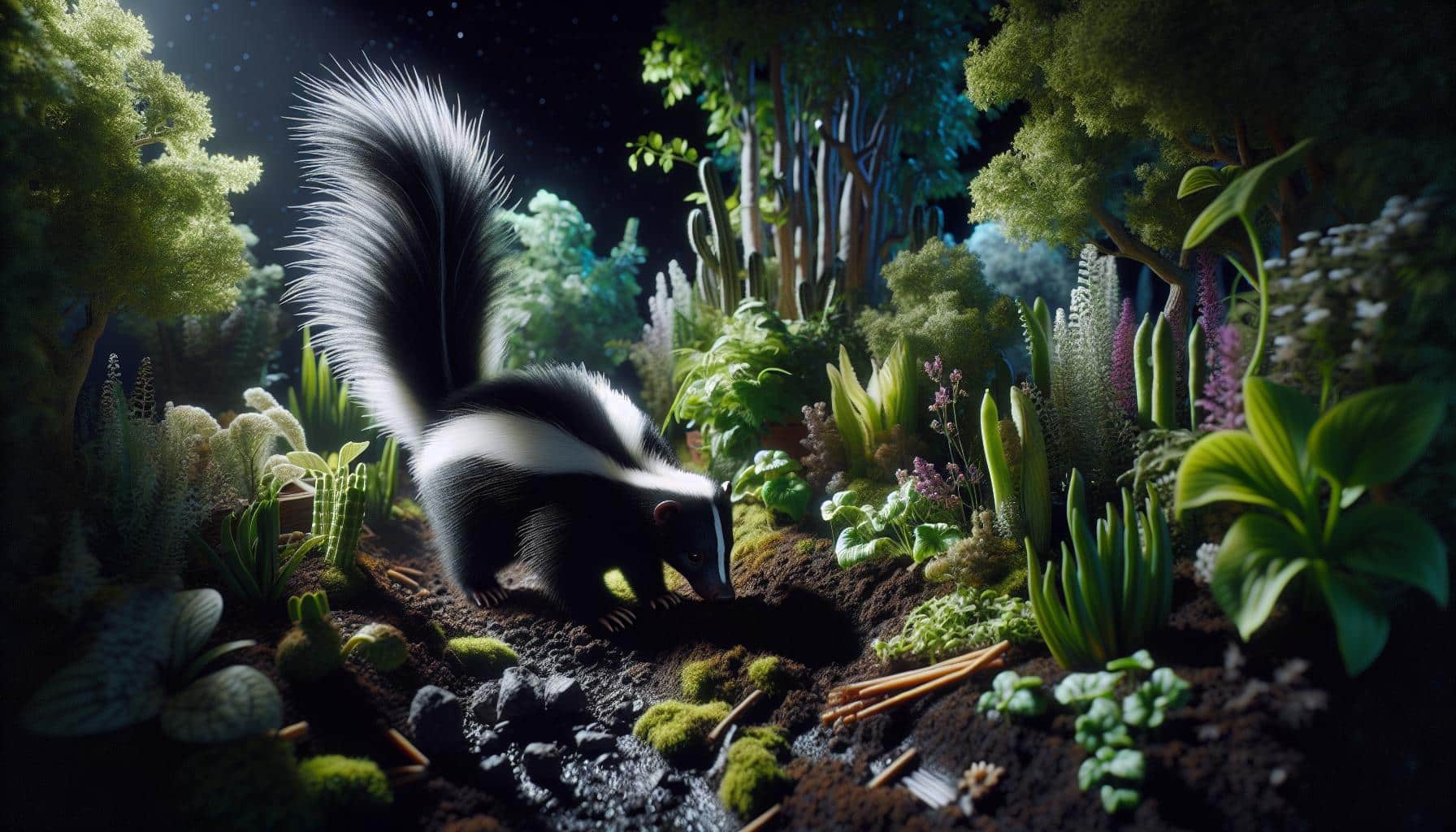
Picture this: you’ve spent countless hours nurturing your lawn into a lush, green paradise, only to wake up one morning to a battlefield. Skunk invasions are like stealthy night thieves, leaving behind a patchwork of holes and upturned earth. It’s a sight that can make your heart sink; all your hard work turned upside down—literally. The culprit? A skunk on a grub hunt, armed with a nose that could rival any truffle pig.
But here’s the twist: while skunks tearing up lawns is a common headache, the solution might not be as complex as you think. In this text, you’ll discover not just why these black and white critters are digging up your dream yard, but also how to address the problem effectively. We’re talking practical, sustainable methods that go beyond the usual quick fixes. So, if you’re ready to reclaim your green oasis from the paws of these nocturnal visitors, you’re in the right place.
Understanding Skunk Behaviour
Nocturnal Habits
You might not know, but skunks are quintessentially nocturnal animals. This means they perform most of their activities under the cover of darkness. But why are these creatures drawn to the night? It’s all about survival. The cloak of night provides skunks with the perfect guise to search for food while staying hidden from predators. Their black and white fur, though conspicuous during the day, blends into the shadows, making them less visible to their enemies.
In my years of observing and writing about wildlife, I’ve noticed that skunks have a particular preference for foraging in the late evening and early morning hours. This timing coincides with the decreased activity of humans and potential threats. It’s during these hours that skunks venture out to dig up lawns in search of their next meal. Have you ever pondered the thought that the reason you rarely catch these culprits in the act is precisely because of their nocturnal nature?
Digging Behaviour
Moving on to the digging behaviour of skunks – it’s a fascinating area of study. Skunks are not digging up your lawns to frustrate you; they’re on a mission for food. Their diet primarily consists of grubs, earthworms, and other soil-dwelling insects. The thick turf in your garden provides an excellent hiding spot for these delicacies. With their sharp claws, skunks excavate small, cone-shaped holes in the ground to snag their prey. This skill is not a sign of wanton destruction but an evolved survival tactic.
Contrary to popular belief, not all digging is bad. Skunks play a crucial role in pest control, ridding your yard of potentially harmful insects. But, the downside is the unsightly holes and upturned earth they leave behind. Here’s a little-known fact: skunks have an acute sense of smell, which they use to locate food sources underground. This olfactory capability is so precise, they can detect a grub several inches below the surface – an impressive feat, wouldn’t you agree?
In a nutshell, understanding the nocturnal and digging behaviours of skunks sheds light on why they do what they do. It’s not about causing havoc but fulfilling their instinctual needs. Reflecting on these insights, one can appreciate the complexity of skunk behaviour and the reasons behind their infamous lawn invasions.
Dangers of Skunks Digging Up Lawn

Damage to Garden
You might visualize your garden as a serene, green sanctuary, but for skunks, it’s a buffet ripe for the picking. These creatures, while seemingly benign, can wreak havoc on your carefully tended plants in their quest for food. But here’s a twist – could this disturbance be a misunderstood service? In digging for grubs and insects, skunks aerate the soil, promoting healthier garden ecosystems. Let’s peel back the layers.
The immediate image of torn-up flower beds and scattered soil might seem like pure vandalism, but consider the natural pest control skunks provide. They’ll often target areas with high grub populations, areas that, if left unchecked, could see your garden suffering even more damage without the skunk’s intervention. But, this silver lining does little to comfort when you’re faced with re-sowing your lawn or replanting vegetables.
From my experience, an untouched garden isn’t just a sign of strong fencing but indicates a balanced ecosystem within. When skunks are overzealous in their digging, it often highlights an imbalance – too many grubs or insects. Integrating natural repellents or deterrents can safeguard your garden without disrupting this balance. Could it be that skunks are merely messengers, alerting us to deeper issues beneath our soil?
Health Risks
The health risks associated with skunks are as pungent as their notorious defense mechanism. While their spray is notoriously difficult to remove, posing an immediate olfactory offense, it’s the unseen dangers that should concern us more. Skunks are carriers of diseases such as rabies, leptospirosis, and even parasites. These ailments can affect both humans and pets, making the skunk’s presence a gamble with health.
Consider rabies, a disease often associated with nocturnal mammals. A skunk’s nocturnal nature increases the potential for unexpected encounters with pets or humans, raising the stakes for virus transmission. It’s crucial to emphasize vaccination for pets in areas where skunks frequent. But here’s an often-overlooked angle – not all skunks are rabid, and their contribution to controlling pests can’t be ignored. Are we overlooking a vital ally due to our understandable focus on health risks?
Leptospirosis, spread through the urine of infected animals, including skunks, can find its way into water sources, soil, and onto our lawns. This bacteria can survive for weeks, posing a silent threat to those unaware of its presence. The conversation here isn’t just about prevention but about awareness. How many are aware of the signs of leptospirosis or the simple steps that can significantly reduce the risk of transmission?
Prevention and Solutions

When you’re up against skunks digging up your lawn, it feels like a direct challenge from nature. But, with the right approach, you can turn the tables. Let’s jump into the strategies that keep your garden safe and smelling fresh.
Secure Your Garden
Securing your garden is akin to fortifying a castle. You wouldn’t leave the gates open for invaders, so why give skunks free entry? First off, consider 1-inch mesh chicken wire. It’s simple yet effective, creating a barrier skunks can’t easily dig under. Ensure it’s deeply embedded, at least 12 to 18 inches into the soil, to thwart any determined diggers.
Then, there’s the matter of denning sites. Skunks love cozy spaces under houses, sheds, or porches. Don’t roll out the welcome mat for them. Close off these areas with ¼-inch hardware cloth, boards, or metal flashing. It’s imperative to make all connections flush and secure. This not only deters skunks but also smaller nuisances like mice and rats. Over my years of gardening, I’ve learned that prevention is less about outright exclusion and more about making your garden a less appealing target.
Ever thought about the role of water sources in your skunk problem? These critters are also after easy-access water. Eliminate standing water around your property to make it less inviting. Remember, it’s about creating a world that says, “Nothing to see or dig here.”
Natural Repellents
Moving on to natural repellents, we’re talking about methods that don’t harm or poison but simply persuade skunks to look elsewhere. Predator urine (think foxes or coyotes) sends a powerful message. It whispers in the most primal language that a predator roams nearby, nudging the skunk to steer clear of potential danger. These repellents are available as granules or liquid and can be sprinkled around the perimeter of your property.
But have you considered the power of DIY mixtures? A concoction of castor oil and dish soap, diluted in water, can work wonders. Sprayed liberally over your garden, it creates an unpleasant environment for skunks without damaging your plants. It’s a method that draws from a deeper understanding of skunk behavior rather than a mere quick fix.
In my experience, the efficacy of natural repellents often surprises skeptics. Yet, it’s crucial to rotate your strategies. Skunks, like all creatures, adapt. If they realize there’s no real threat behind the predator urine scent, they’ll return. Keep them guessing, and you’ll keep them at bay.
Conclusion
Securing your garden and eliminating skunk attractions are key steps you’ve learnt to protect your lawn. Remember, consistency and adaptability in your approach will ensure these nocturnal visitors find somewhere else to forage. Don’t hesitate to rotate between natural repellents and physical barriers to keep them guessing. With these strategies in hand, you’re well-equipped to maintain a skunk-free yard, letting you enjoy your outdoor space in peace.
Colin Macmillan is a seasoned entrepreneur and the CEO of Riverwood Landscape, a leading landscaping company based in Canada. He has been at the helm of the company since leaving high school, demonstrating his strong leadership skills and business acumen.
Colin’s expertise lies in various aspects of landscaping, including lawn care, interlocking, sod installation, and commercial maintenance. His hands-on approach and dedication to the craft have been instrumental in building Riverwood Landscape into a reputable brand.
One of his most notable achievements is the creation of a successful landscape franchise that services multiple locations. This accomplishment underscores his strategic thinking and ability to scale operations effectively.
Colin has also had the privilege of working with Guelph Hospital for landscaping and maintenance, a testament to the trust and reliability that his company has earned over the years.
His professional mission is to offer the best services and experiences for customers, a goal that he tirelessly pursues. Colin’s commitment to excellence and customer satisfaction continues to drive the growth and success of Riverwood Landscape.








